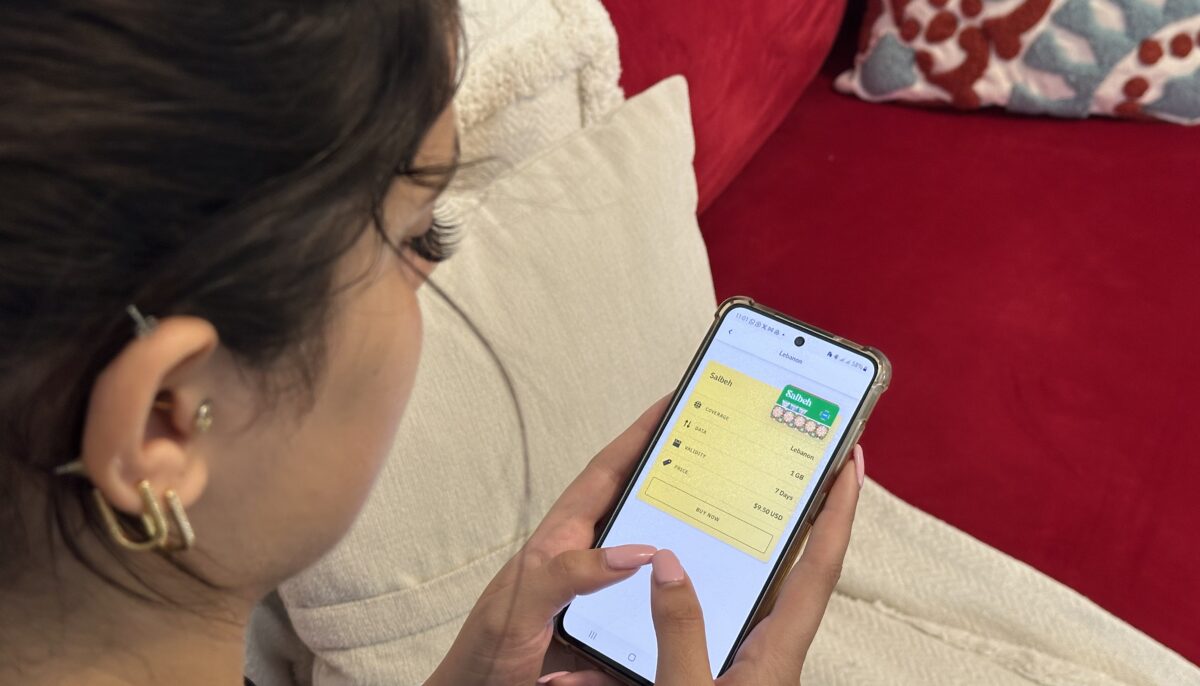“Are you interested in connecting to the internet without a physical SIM card?” A video circulating in Lebanon discusses how the country’s two state-affiliated telecommunications companies, Alfa and Touch, have launched their electronic SIM (eSIM) services.
This service isn’t new, neither globally nor in Lebanon. Alfa introduced eSIMs as early as 2019, and about four years later, Touch did the same, both companies told SMEX.
Demand for eSIMs surged after the Israeli occupation destroyed Gaza’s communications infrastructure during the early months of the genocide. Some have found they could still connect to the internet by linking their phone to neighboring networks, such as the Egyptian or Israeli.
Using eSIMs has allowed many people within Gaza to communicate with each other, keeping them connected to the outside world.
After the Israeli bombardment in the South, SMEX investigated eSIM options from Alfa, Touch, and international providers to see if they work on the local networks.
eSIMs by Alfa and Touch: Better Late Than Never
Alfa and Touch’s eSIM cards are identical to regular SIM cards, but instead of using a physical chip, people can activate the eSIM by contacting their telecom provider. However, their phone must support eSIM technology for it to work.
eSIMs are digital SIM cards and cannot be physically removed from devices. If local networks are unavailable, users may struggle to connect because eSIMs rely on the same network infrastructure as regular SIM cards.
Alfa and Touch confirmed to SMEX that all services available on regular SIM cards, such as roaming for calls and data, also work on eSIMs.
According to Touch, you can visit any Touch service center or certified outlet to switch your physical SIM to an eSIM or purchase a new eSIM (with a new mobile number). Existing Touch customers can also make the switch through the Touch mobile app.
The telecom provider stated that eSIMs allow users to run multiple SIM cards on the same device and easily switch between phone numbers or deactivate them when needed.
New eSIMs need a valid ID to be issued and can only be purchased in person.
The eSIM tariffs are as follows, excluding taxes:
- New prepaid line: $7
- New postpaid line: $16.67
- Swap your physical SIM for an eSIM: $1.67
New users will be charged $7 (excluding taxes) for $1 of call credit for five days, excluding any data credit for using the internet.
Alfa provided the following instructions for buying an eSIM in Lebanon.
For Prepaid and Postpaid Subscribers:
- Visit any Alfa store or Point of Presence (PoP) with your ID card, valid passport, or civil record (no older than 6 months) to purchase the QR code.
- Use your eSIM-compatible device to scan the QR code.
For Postpaid Subscribers:
- Log in with your username and password, complete the eSIM form, and you will receive the QR code via email within 24 working hours.
The eSIM tariffs are as follows, excluding taxes:
- New prepaid line: $7
- New postpaid line: $16.67
- Swap your physical SIM for an eSIM: $1.67
Users with foreign SIM cards can use their phones in Lebanon if their provider has a deal with local networks Alfa and Touch. The same applies to traditional SIM cards.
International eSIM Applications in Lebanon: Outrageous Rates
After an exhaustive search for eSIM mobile applications that work in Lebanon, we found only two. The first is the Airalo app, which offers a package for Lebanon called “Salbeh,” a local term meaning “cute.”
What’s perhaps not so “salbeh” about the service in Lebanon is that it is one of the most expensive in the region. It offers seven days of 1 GB of data for $9.50, compared to $8 in Morocco, $7 in Algeria, $4.50 in the UAE and Tunisia, and $5 in Jordan, Libya, Qatar, and Iraq. Airalo offers larger packages and more days at better prices in other countries.
Although this package is available on the Airalo application and reportedly works in Lebanon, as confirmed by a user traveling to Beirut, a source at Touch said that eSIM applications do not operate in Lebanon.
In its official response to SMEX’s questions, Touch stated that “it does not have any agreement with any eSIM service provider for international roaming.”
Nonetheless, people have reported that Airlo works fine for them.
Truphone is another application providing eSIM services in Lebanon, this time via Alfa. Lebanon appears on the coverage map published by the Truphone website. To confirm this, we contacted Truphone, who assured us their services are available in Lebanon.
Despite stating it covers Lebanon in cooperation with the MIC1 company (Alfa), Truphone also denied “any direct deal with any eSIM service provider at the present time.”
SMEX’s IT Consultant, Ragheb Ghandour, explains that eSIM applications can operate through agreements with foreign telecommunications companies that offer international roaming services in various countries, including Lebanon.
These applications do not necessarily have direct agreements with the local companies Alfa and Touch. As a result, their eSIM service only allows users to access the internet on their phones, but not make or receive phone calls.
As for the eSIM applications frequently advertised in Lebanon, such as Usims, MontySIM, Simly.io, and Google Fi, our team found that most of them do not work in Lebanon.
The global shift from plastic SIM cards to eSIMs is well underway, with Alfa offering eSIM services for years and Touch recently joining. However, only a limited number of eSIM applications function in Lebanon. In a region grappling with crises and conflict, maintaining reliable communication and access to diverse connectivity options has become more essential than ever.



